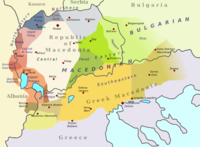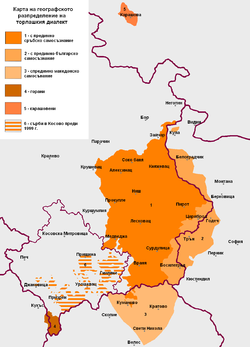- Gora dialect
-
South Slavic
languages
and dialectsWestern South Slavic Slovene
dialects
Prekmurian dialect · Resian dialectSerbo-Croatian Bosnian
Štokavian dialectCroatian
Štokavian dialect
Čakavian · Kajkavian
Burgenland · Molise
TorlakianSerbian
Štokavian dialect
Ekavian · Ijekavian
Torlakian
Slavoserbian
Serbian Romany
Užice dialectDifferences between standard
Bosnian · Croatian · SerbianMontenegrin · Bunjevac dialect Eastern South Slavic Church Slavonic (Old) Bulgarian
Dialects
Banat
Torlakian · MeshterskiMacedonian
Dialects
Western dialects
Southeastern dialects
Northern Dialects
Torlakian
Spoken Macedonian
Standard MacedonianTransitional dialects Serbian-Bulgarian
Transitional Bulgarian dialects
Torlakian · Gora dialectCroatian-Slovenian
KajkavianAlphabets Modern
Gaj's Latin1 · Serbian Cyrillic
Macedonian Cyrillic
Bulgarian Cyrillic
Slavica
SloveneHistorical
Bohoričica · Dajnčica · Metelčica
Arebica · Bosnian Cyrillic
Glagolitic · Early Cyrillic1 Includes Banat Bulgarian alphabet. The Gorani or Našinski (literally meaning "our language") language is the variety of South Slavic spoken by the Gorani people in the border area between Kosovo, Albania and Macedonia. It is part of the Torlakian dialect group[1] which is the transitional dialect between Eastern and Western South Slavic languages.
Contents
Distribution and classification
The dialect is spoken across the Gora region. It is spoken in 18 villages in Kosovo, 11 in Albania and 2 in the Republic of Macedonia. In Kosovo and the Republic of Macedonian it is written in either the Serbian or Macedonian Cyrillic Alphabets, whereas in Albania, the Latin Albanian alphabet is used. In the 1991 Yugoslav census, 54.8% of the inhabitants of the Gora municipality said that they spoke the Goranian language, roughly in proportion to the number who considered themselves ethnic Gorani. Then a little less than half from the inhabitants of Gora described their language as Serbian.[2]
The dialect is related to the neighbouring Prizren-South Morava dialect area to the north-east, which comprises the Serbian/Torlakian varieties spoken in the southern half of Kosovo and in south-eastern Serbia, as well as to the northernmost dialects of Macedonia. In the context of Macedonian dialectology, it is described as having particular close links to the Lower Polog dialect of the Polog and Tetovo regions,[3] which are situated just opposite the Gora area on the other side of the Šar Mountains.
Goranian has also been classified as a part of the Bulgarian dialect area, by Bulgarian,[4] as well as some foreign anthropologists.[5] In 2007 the Bulgarian Academy of Sciences sponsored and printed the first Našinski-Albanian dictionary (with 43,000 words and phrases) by Goranian researcher Nazif Dokle who considers the language a Bulgarian dialect.[6]
On the other hand, former Yugoslav linguists Vidoeski, Brozović and Ivić identify the Slavic dialect of the Gora region as Macedonian.[7] According to some sources in 2003 the Kosovo government acquired Macedonian language and grammar books to be taught in Gorani schools.[citation needed]
Phonological characteristics
The Gora dialect shares with standard Serbian, the northernmost dialects of Macedonian and western dialects of Bulgarian the vocalisation of earlier syllabic /l/ in words like vuk ('wolf') (cf. Macedonian volk, standard Bulgarian vălk). With Serbian it also shares the reflex of */tj, dj/ as /tɕ/, as opposed to standard Macedonian /c/ (‹ќ›).[8] With the westernmost dialects of Macedonian, as well as most of the Bulgarian dialects, it shares the reflex of "big Yus" (*/ɔ̃/) as /ə/ (ӑ) in words like păt ('road') (cf. Macedonian pat, Serbian put). With standard Macedonian and some Bulgarian dialects it shares the reflexes of */ĭ, ŭ/ as /e, o/ in words like den ('day') and son ('dream'). With standard Macedonian, standard Serbian and some Bulgarian dialects it shares the retention of syllabic /r/ in words like krv ('blood').[9]
Examples
- Jas som od Kosharisht. - I am from Kosharisht.
- Srećen rodni den! - Happy birthday!
- Ja zborim Našinski jezik. - I speak Našinski language.
Typical words
Here is a song sung in the typical Gora dialect.
-
- Što se beli, gore Šar planina?
- Da l'je snegče, il'je belo stado?
- Nit'je snegče, nit'je belo stado.
- Da je snegče, bi se rastopilo,
- Da je stado, bi se rasturilo.
- Več toj beše Milkino čadorče,
- Pod čadorče bolna Milka lega.
- Brata i gu Turci zarobili,
- Zarobili, paj ga obesili.
Another two songs in Našinski, from Shishtejec
-
- Verba đurđevdenjova
- Ta šot si gi granke širnala
- Mori verbice đurđevdenova
- Dali jeno gajle sin e mala
- Ja mater som go imala
- Mati mi go gajle galuala
- So mleko presno me ranjila
- Za tija som tenka i visoka
- Za tija som bela i cervena
- Tvuje da ti srec izgore.
-
- Verno libe
- Gledaj me gledja libe, abe verno libe,
- na gledajmise dur ti som ovde.
- Utre ke odim abe vrno libe dalek-dalek
- na pusti Gurbet.
- Racaj po racaj libe šo da ti kupim,
- ti da mi kupiš
- abe gledaniku cerna šamija, ja da ga nosim
- abe gledaniku I da ga želam.
- Racaj po racaj abe verno
- libe šo da ti pratim
- Ti da mi pratiš abe
- gledaniku šarena knjiga
- Ja da ga pujem abe
- gledaniku i da ga želam
References
- ^ Browne, Wayles (2002): Serbo-Croat. In: Bernard Comrie, Greville G. Corbett (eds.), The Slavonic Languages. London: Taylor & Francis. [1]. p. 383
- ^ Goran speech by dr. Radivoje Mladenovic (Serbian)
- ^ B. Koneski (1983), A Historical Phonology of the Macedonian Language by Blaže Koneski
- ^ Младенов, Стефан. Пътешествие из Македония и Поморавия, в: Научна експедиция в Македония и Поморавието 1916, София 1993, с. 184. (Mladenov, Stefan. Journey through Macedonia and Pomoraviya, in: Scientific expeditions in Macedonia and Pomoraviya 1916, Sofia 1993, p. 184) Асенова, Петя. Архаизми и балканизми в един изолиран български говор (Кукъска Гора, Албания), Балканистични четения, посветени на десетата годишнина на специалност “Балканистика” в СУ “Св. Климент Охридски”, ФСлФ, София, 17-19 май 2004 (Assenova, Petya. Archaisms and Balkanisms in an isolated Bulgarian dialect (Kukas Gora, Albania), Balkan studies readings on the tenth anniversary of the major Balkan studies in Sofia University, May 17–19, 2004)
- ^ Albania: from anarchy to a Balkan identity, Miranda Vickers, James Pettifer, C. Hurst & Co. Publishers, 1997, ISBN 1850652791, p. 205.
- ^ Dokle, Nazif. Reçnik Goransko (Nashinski) - Albanski, Sofia 2007, Peçatnica Naukini akademiji "Prof. Marin Drinov", s. 5, 11, 19 (Nazif Dokle. Goranian (Nashinski) - Albanian Dictionary, Sofia 2007, Published by Bulgarian Academy of Sciences, p. 5, 11, 19)
- ^ http://www.seelrc.org:8080/grammar/mainframe.jsp?nLanguageID=3 Macedonian by Victor Friedman, pg 4 (footnote)
- ^ B. Videoski (1999), Dijalektite na Makedonskiot jazik, MANU.
- ^ Friedman, Victor (2001), "Macedonian" SEELRC, p.7
Dialects of Macedonian Western CentralWestern and
northwesternUpper Polog · Debar · Drimkol-Golo Brdo · Galičnik · Reka · Vevčani-Radožda · Struga · Ohrid · Upper Prespa · Lower Prespa
Northern EasternWesternSoutheastern EasternSoutheastern1 Also considered a dialect of Bulgarian. 2 Considered to be a part of the transitional Torlak dialect and as a subdialect of Bulgarian, Macedonian, and Serbo-Croatian.Categories:
Wikimedia Foundation. 2010.

